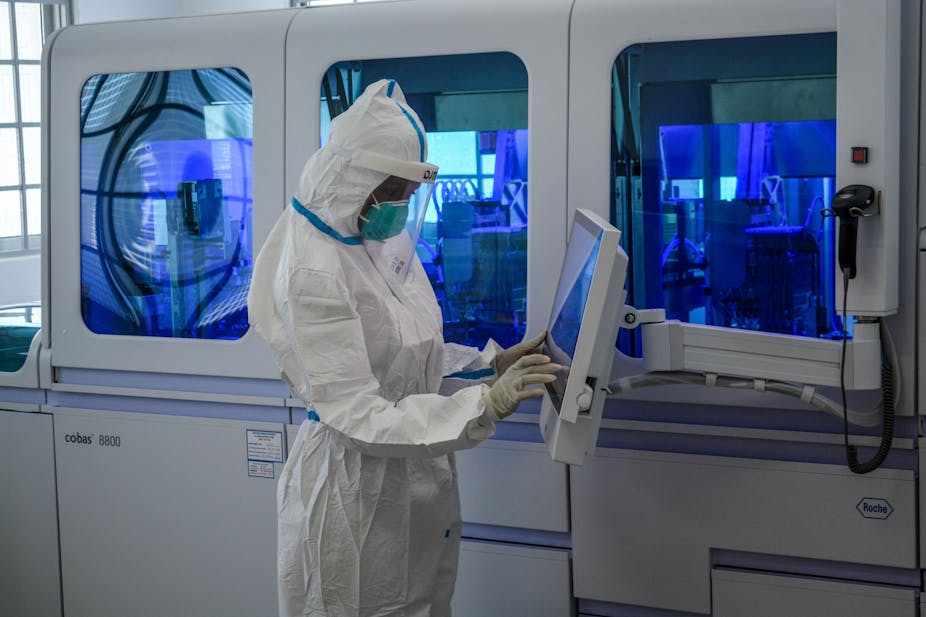Nigeria’s Tertiary Education Trust Fund has approved N8.5bn (US$16.83m) for medical research this year an increase of 13.33%. Of this amount, N1bn (US$1.98m) is specifically for research on COVID-19. The fund was set up in 1993 to improve federal and state tertiary education in Nigeria, partly by supporting research and publications. Its main source of income is the 2% education tax paid by registered companies. It’s managed by an 11-member board of trustees. The Conversation Africa’s Wale Fatade asked Friday Okonofua, professor of medicine and pioneer vice-chancellor of Nigeria’s first university of medical sciences, to comment on the latest announcement.
Is this a step in the right direction in funding medical research?
I believe so. Nigeria is currently one of the countries with the lowest health research funding in the world. It contributes 0.22% of its GDP to research. Despite the plethora of health issues in the country, and the poor health indicators, very little appropriation exists in the national budget for addressing health research. The budget for research was N5bn ($9.9mn) in 2019 under the National Research Fund. It was raised to N7.5bn ($14.85mn) in 2020 and is still the same this year. It is to this fund that N1bn ($1.98mn) has just been added. This extra is specifically for research around COVID-19. The National Research Fund is managed by the Tertiary Education Trust Fund. I believe this intervention is not enough to address the inadequate provision for health research in the country. It is also important because global research and development pipelines for diseases that affect African countries are inadequate.
How is medical research funded generally in Nigeria?
Medical research is not well funded in Nigeria. I have never seen any provision made for health research funding by any teaching hospital in Nigeria. Most universities provide little or no funding for health research. Existing funds for research come from donor organisations. These include the Gates Foundation, the International Development Research Centre, Canada and the World Health Organisation. The federal government got a loan in 2014 from the World Bank which enabled the establishment of some centres of excellence in Nigerian universities. A few of these centres focus on health issues. Very little funding for health research comes from within the country.
Read more: Science and technology hold the key to Nigeria reaching its full potential
What percentage of medical research funding comes from the federal government in Nigeria?
It is tough to say specifically apart from figures we have on research generally. While the education trust fund has done well in funding specific health-related research in some Nigerian universities, it is not enough. Some medical researchers across the country have accessed these funds for their research. Apart from this, I am not aware of any other intervention of the federal government to address health research in Nigeria.
How can we improve funding for medical research?
The answer is simple. The federal government and all state governments should allocate funds for health research in their annual budgets. This should be for health research specifically and not research generally. The education trust fund should continue its present great work. But its contribution is not sufficient to handle the quantum of health challenges that need to be resolved in Nigeria, along with innovations that need to be identified to promote the health and social well-being of all Nigerians.
Health is a critical component of the Sustainable Development Goals. And as COVID-19 has demonstrated, it is essential for any country’s prospective development. Research is needed to galvanise Nigeria’s health system, which ranks 187th out of 195 countries (according to the World Health Organisation).
What lessons can we learn from other countries’ approach to funding medical research?
Regarding the contribution of governments to research, it is evident that African countries have performed relatively poorly as compared to other countries. In total, available evidence indicates that sub-Saharan African countries contribute 0.4% of their gross domestic product (GDP) to research, compared to Europe, Asia, and North America that contribute 27%, 31%, and 37%. Nigeria contributes 0.22%, one of the lowest in the world.
Furthermore, the Nigerian government is often unable to synthesise research evidence for decision-making. This limits its ability to understand and prioritise the importance of indigenous research in health within the context of health improvement and social development. A proper integration of research frameworks within policy making in Nigeria is critically important to improve the integrated performance of the country’s healthcare system. This should include capacity building for managers and policymakers to enable them to make adequate provisions in the annual budget and development planning for research, their involvement in setting research agendas, planning for the delivery of health research, and the effective use of research results.
Read more: What it will take to produce vaccines in Nigeria: money's just the first step

